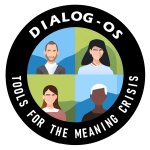The framing offered here for Wisdom largely comes from Nathan Vanderpool’s (Respond Network) “Theory of Wisdom” article, which you can read in its entirety here (link forthcoming).
What’s provided below is an overview and mapping of its ideas onto the work and offerings within Dialog-OS.
At its most basic layers, Wisdom is the harmonizing of View, Care and Action. A constant unfolding process of tuning-in (calibrating) each of these areas away from contracted distortions into further alignment with the Good, the True and the Beautiful (link).
What wisdom is not, is purely scientific/mathematical (cold calculating) knowledge. Wisdom is also not just the possession of virtuous traits, or ideology.
As such, a space that only offers propositions (flat earth theory), cannot be wise. A space that offers only procedural knowledge, the knowledge on how to do something (like unclogging a drain), also cannot be wise. The same goes for spaces focused only on perspectives (DEI training), or only on participation. Having knowledge alone isn’t wisdom.
However, an environment, a playground, a dojo that can touch on all of these four ways of knowing (Participatory, Propositional, Perspectival and Procedural – John Vervaeke’s 4P’s of knowing), allowing them to interpenetrate and inform one another, would be wise one, one we’d say is fit for ‘wisdom training’.
Wisdom Training is a form of (often-serious) play that deepens that alignment, that tuning-in across view, care and action. There are four areas of emphasis: Dialogue, Imaginal, Mindfulness and Embodiment. We believe participation in multiple practices that address these areas of emphasis make a wise ecology of practices.
Important – Dialog-OS and its courses do not represent an exhaustive representation of all suitable wisdom practices. No one can claim that. While we use a lot of smaller or ‘simple’ practices to directly work on each of the D.I.M.E. we tend to culminate that work in complex dialogical practices that don’t just call upon Dialogue, but also Imaginal, Mindful and Embodiment skills.
For example, you can think of Dialog-OS a bit like athletic fitness. Sometimes we’re at the gym, using one of the machines to isolate a particular muscle, to make it strong(er). And other times, we’re about to enter an triathlon, the culminating event that takes our work from the gym and allows us to perform there.
The expectation, the direction, of engaging in an ecology of wisdom practices, is developing that tuning-in muscle that affords one better well-being in relationships (to oneself, to others and to the world), leading to better meaning in life.
Participating in these practices within the context of community (fellowship), within a framework of authenticity (the invitation to congruent expression), offers us a greater chance of avoiding our self-deceptive tendencies, and the invitation and openness to sense-make (‘make-sense’) of our experiences together, also offer us persistent opportunities to avoid group-think.
You can see the Kernel page for more information on one of Dialog-OS’s spaces that provides engagement with Wisdom Practices. Related workshops tend to only be reflected/announced through our newsletter or Meetup page.
